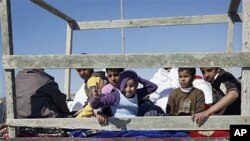The head of UNICEF's operations in Libya says four months into the Libyan crisis, children and women are beginning to pay a huge price. He says the situation is still manageable, but warns the situation for women and children will worsen the longer the conflict continues.
The United Nations Children’s Fund says the Libyan conflict is seriously disrupting children’s lives and normal routines. It says schools are closed. In the capital, Tripoli, children are traumatized by the continuing shelling by NATO coalition forces. And children throughout the country are suffering from the loss of their parents, relatives and friends.
Unfortunately, UNICEF’s Libya Response Team Leader, Pierre Poupard, said his agency and others can do little to help them because they have very limited access to many parts of the country.
He said UNICEF is particularly concerned about landmines. He said most of the mines are being laid by Moammar Ghadafi's forces around Tripoli, Misrata and other government controlled areas. They also exist in the opposition stronghold of Eastern Benghazi.
Poupard said that so far the casualties are relatively small. The International Committee of the Red Cross reports 13 children have been killed by landmines. He said this probably is an underestimation, however, and the number of casualties is likely to grow.
“We know that the children in the East part of the country are playing with those things," said Poupard. "They take that like trophies. They say, going back home, 'look dada, this small piece of metal has not exploded.' They just wanted to play with that because they do not know.”
Poupard notes Libya is a middle-income country. Levels of poverty are not as dire as in such places as Ivory Coast or Haiti. As a consequence, he said most people still have the means to support themselves and are not in need of massive humanitarian assistance. He said the physical condition of children is still good.
“We have visited several hospitals all over the country, including in the west part of the country -Tripoli - but also in Misrata, in Benghazi, Ajdabiya, Nalut and so on," he said. "I can tell you, not one single case of malnutrition. That is important to mention. It means that coping mechanisms after four months are still working.”
He warns, though, the longer the conflict goes on, there is likely to be a disruption of those social services. Poupard said people will run out of basic food and basic services and will need international assistance.
He said the quality of water in Libya is still good, although chemicals to keep the water clean and spare parts to maintain the water system are needed. And Poupard points up that medical supplies and vaccines are beginning to run out.
Children Paying Huge Price In Libyan Conflict
- By Lisa Schlein




